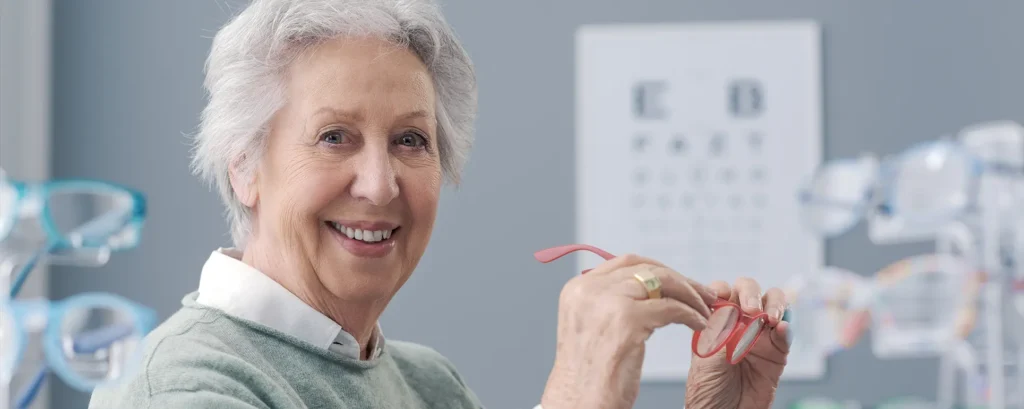If you’ve been told you have cataracts, or if you’re already noticing cloudy vision, glare, or struggling with tasks like reading and driving, you’re probably exploring your options. One question that comes up time and again is: “Do I need a referral for private cataract surgery, or can I just book myself in?” The answer isn’t always straightforward, but by the end of this article you’ll have a clear understanding of how the process works, when a referral is required, when it isn’t, and why private cataract surgery is often more flexible than the NHS route.
Let’s go through this step by step. We’ll look at what a referral actually is, how the NHS and private pathways differ, how self-referral works in practice, and what advantages it brings. We’ll also look at those cases where a referral is still useful or necessary, so you know exactly what to expect whichever route you choose. And if you’re short on time, there’s a dedicated FAQ section at the end that covers ten of the most common questions patients ask about referrals for cataract surgery.
What exactly is a referral?

A referral is a formal request from one healthcare professional (usually your GP or optometrist) to a specialist, asking them to see you for further assessment or treatment. It normally includes details about your vision problems, your general medical history, and sometimes your eye test results. In the NHS system, this referral is essential because it’s the gatekeeper that determines whether you move from community care into hospital-based ophthalmology.
In private healthcare, the situation is different. Some clinics still like to see a referral from your GP or optician, but many are happy for you to approach them directly. That’s what’s known as self-referral, and it’s one of the main reasons people find the private route more appealing — you can often bypass the extra step and get straight to a specialist consultation.
How the NHS pathway works
To understand why private care feels so much simpler, it helps to see how the NHS process normally goes. If your optician notices cataracts that are affecting your daily life, they’ll usually advise you to visit your GP. Your GP then sends a referral letter to the local hospital eye service. You’re placed on a waiting list for an assessment, and if the hospital agrees that your cataracts meet their criteria for surgery, you’re booked in for the operation.
This all sounds reasonable, but the reality is that NHS waiting times can be long. In many areas, patients are waiting months just to be seen, and even longer for surgery itself. The referral system is there to manage demand and make sure limited resources are used fairly, but it does add layers of delay and bureaucracy.
How the private pathway is different
In the private sector, things work much more directly. You can usually contact the clinic yourself, book a consultation with an ophthalmologist, and have all the necessary tests done at your first visit. If you’re suitable for surgery, you can often have it scheduled within a matter of weeks.
This doesn’t mean safety is compromised — you’ll still have a full assessment and all the same checks that NHS patients have. The difference is that you don’t always need that initial referral letter to get the ball rolling. Private clinics want to make the process as straightforward as possible, and removing the referral requirement is one way they do that.
Self-referral: what it means and how it works
When a clinic says they accept self-referrals, it simply means you can book yourself in without waiting for your GP or optician to formally write to them. You’ll still be asked about your symptoms, your medical history, and any eye tests you’ve had recently, but the clinic will handle everything else from there.
Self-referral doesn’t mean skipping steps — it just means you don’t need permission from another healthcare professional before you can see a consultant. The consultant will still examine your eyes, perform measurements, and check whether surgery is right for you. If they need more information, they may ask you to provide test results from your optometrist, but that isn’t the same as needing a formal referral letter.
When a referral may still be needed

Although self-referral is common in private cataract surgery, there are some situations where you may still need a referral. For example:
- If you’re using private medical insurance. Insurers often require a GP referral before they approve payment for surgery. This is less about the clinic’s rules and more about your insurer’s policy.
- If your case is complex. Patients with conditions like glaucoma, diabetic eye disease, or previous retinal surgery may be asked to provide more detailed records or a referral from a specialist.
- If the clinic also provides NHS services. Some private providers work under NHS contracts, and in those cases they may stick to NHS-style referral requirements even for private patients.
So while many people can go straight to a private clinic, it’s worth checking the details before you book.
Why self-referral can make things quicker
The big advantage of self-referral is speed. With the NHS, you wait for your GP appointment, then wait again for the referral to be processed, then wait some more for the hospital to book you in. With private care, you cut out that first step entirely.
Most private clinics can see new patients within days or weeks, and surgery itself can often be scheduled within a month of your consultation. That means less time living with poor vision, less risk of falls or accidents, and more control over when and how your treatment happens.
The role of your optometrist
Even if you choose to self-refer, your optometrist still plays an important role. They’re often the first to notice your cataracts, and they can provide valuable test results that help the clinic make a decision quickly. Many optometrists also have established links with private clinics and can guide you towards reputable options.
So while you don’t always need them to write a formal referral letter, it’s still a good idea to keep them in the loop. They can help smooth the process, and they’ll be involved in your aftercare once surgery is complete.
Insurance and referrals: what you need to know
If you’re paying for surgery out of your own pocket, referral requirements are usually minimal. But if you’re relying on private medical insurance, the situation is different. Insurers often demand a GP referral before they’ll agree to cover the cost of surgery. They may also restrict you to certain approved consultants or clinics.
That’s why it’s important to check your policy carefully before you book anything. Don’t assume that just because a clinic accepts self-referrals, your insurer will go along with it. Always get confirmation in writing from your insurance company before committing to treatment.
Choosing a clinic: what to check
If you’re considering self-referral, there are a few things worth checking when choosing a clinic:
- Do they explicitly state they accept self-referrals?
- Are they registered with the Care Quality Commission (CQC)?
- Do they publish information about their surgeons and outcomes?
- Do they offer a full range of lens options, including premium lenses like multifocals and torics?
- What’s included in their quoted price — consultation, surgery, aftercare, and potential upgrades?
By asking these questions, you can avoid surprises and make sure you’re getting high-quality care.
Frequently Asked Questions
1. Can I go straight to a private cataract surgeon without seeing my GP?
Yes, in most cases you can. Many private eye clinics allow patients to book consultations directly without the need for a GP referral letter. This is what’s called self-referral, and it means you can contact the clinic yourself, arrange an appointment, and undergo the necessary assessments without waiting for another doctor to send you. You’ll still go through a full pre-surgery check, including measurements of your eyes and a review of your medical history, but you won’t need that extra layer of paperwork before you get started.
2. Will my insurance cover cataract surgery if I self-refer?
This really depends on the terms of your insurance policy. Some insurers are happy to accept self-referrals as long as you use a consultant or clinic on their approved list, while others require a GP referral before they will approve treatment. The safest approach is to contact your insurer directly before booking and ask what their rules are for cataract surgery claims. If you don’t check, you could risk being liable for the full cost yourself if they later refuse to pay, even though the clinic was willing to see you without a referral.
3. What happens if I have other eye problems as well as cataracts?
If you have additional eye conditions such as glaucoma, macular degeneration, diabetic eye disease, or a history of retinal surgery, a private clinic may want extra details before accepting you for surgery. In some cases, they might ask for a referral from your GP or your existing eye specialist so they can fully understand your ocular history. This isn’t about creating barriers, but about making sure surgery is safe and that your cataract is the main cause of your vision problems. Complex eyes need a bit more care in planning.
4. Is it safer to go through my GP first?
Safety doesn’t depend on whether you came through your GP or went directly to the clinic. What matters is the quality of the surgeon, the thoroughness of the assessment, and the clinic’s safety protocols. Private clinics that accept self-referrals still carry out all the same checks as they would for any other patient, including eye scans and medical history reviews. Going through your GP might give you a more complete referral letter, but the clinic itself will always do its own independent assessment before surgery anyway.
5. Do optometrists provide referrals for private cataract surgery?
Yes, many optometrists are happy to provide referral letters if needed, and they can often supply useful information like your most recent prescription or scan results. Even if the clinic doesn’t require a formal referral, having your optometrist involved can speed things up because they can provide data that saves the clinic from repeating tests. Optometrists also tend to know which private clinics are reputable, so they can point you in the right direction if you ask for advice.
6. Can I switch from NHS to private care if I’m already on a waiting list?
Absolutely, and many people do. If you’ve been referred into the NHS system but the waiting time is longer than you’re comfortable with, you can decide to go private instead. Some patients even keep their NHS referral active as a fallback while exploring private options. If you self-refer to a private clinic, you’ll usually be seen much sooner, and if you do go ahead privately, you can let the NHS know so they can free up your slot for someone else.
7. What information should I bring to my private consultation?
It helps to be prepared. Bring your most recent glasses prescription, any test results or eye scans you’ve had (such as OCT or corneal topography), a list of your current medications, and a summary of any medical conditions you have. If you’ve had previous eye treatments or surgery, those details are important too. Having this information ready makes your consultation more efficient and helps the surgeon give you the most accurate advice on your options.
8. Will private clinics ever refuse to see me without a referral?
Some clinics might. This is more likely if they work closely with insurers, or if they also run NHS services and therefore stick to NHS-style referral policies. In most cases, though, private cataract providers welcome self-referrals, as long as you’re paying out of pocket. If you’re unsure, the best thing to do is ask the clinic’s bookings team directly whether they accept patients without a GP or optometrist referral.
9. How long does it usually take to get surgery privately if I self-refer?
It’s generally much quicker than going through the NHS. Many private clinics can see you for an initial consultation within one or two weeks of your first contact, and if surgery is appropriate, it can often be scheduled within another few weeks. In practice, that means you could have cataract surgery within a month of deciding to go private, compared with several months of waiting in the NHS system. The exact timing depends on the clinic’s schedule and your availability, but it’s usually far faster.
10. Is there any downside to self-referring?
The only real downside is when insurance is involved. If your policy demands a GP referral and you skip that step, you might find you’re not covered and end up paying the cost yourself. Otherwise, self-referring doesn’t affect your safety or the quality of your care, because the clinic will still carry out full checks before surgery. For most people, self-referral is a convenient way to save time and get treatment sooner, without any reduction in the standards of care they receive.
Final thoughts
So, do you really need a referral for private cataract surgery? In most cases, the answer is no. Many private clinics, including ours, allow you to self-refer, which means you can book a consultation directly without waiting for your GP or optometrist to write a letter first. That saves time, speeds up access to surgery, and gives you greater choice in lens options and appointment times. The only exceptions are if you’re using private medical insurance or if your eye health is particularly complex, in which case a referral may still be required.
The important thing to remember is that self-referral doesn’t mean skipping safety checks. We always carry out thorough assessments before surgery, regardless of how you came to us. What it does mean is that you have more control over the process and can often move things forward much faster than through the NHS pathway.
If you’re considering treatment and want to explore your options in more detail, you can book a consultation with us at London Cataract Centre and speak directly with our team. Taking that first step could bring you closer to clearer, more confident vision without unnecessary delays.

